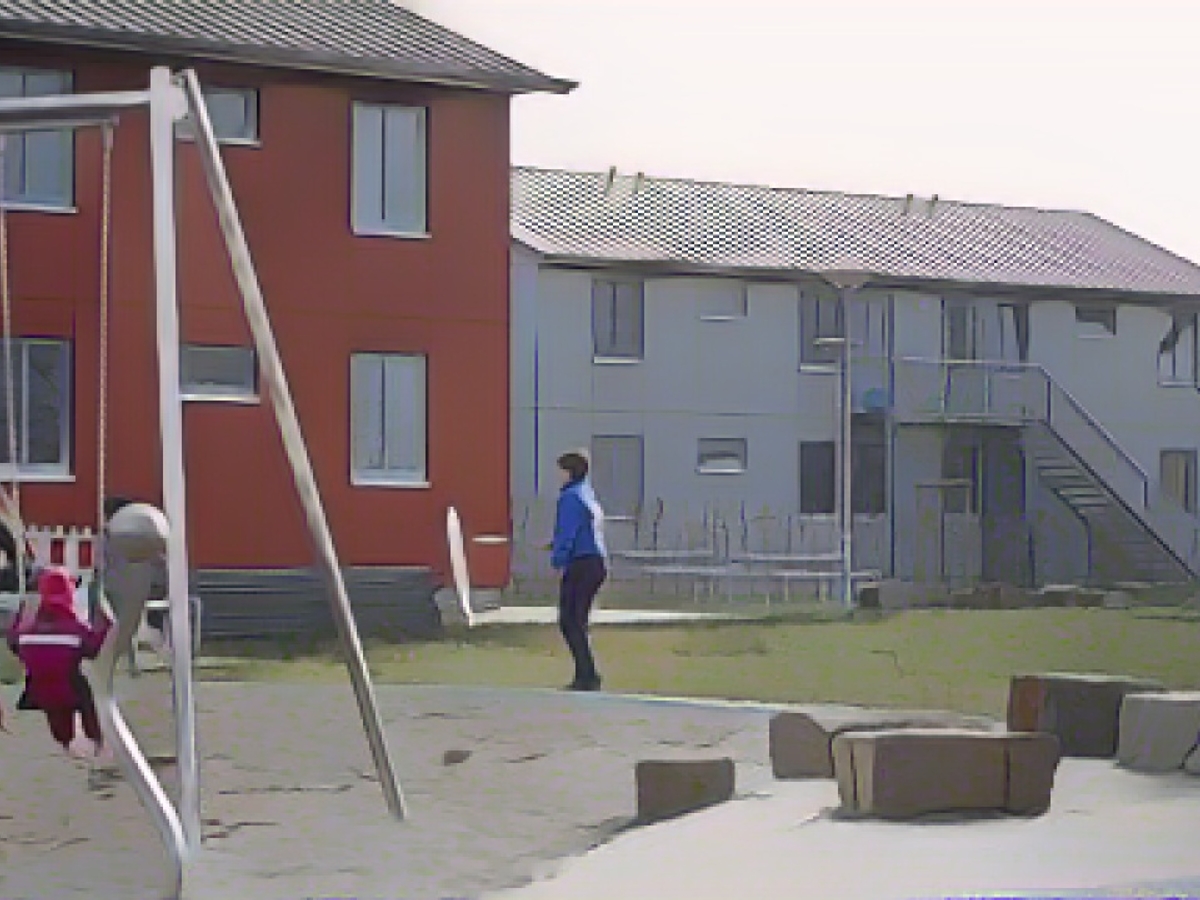Refugee accommodation
In initial reception centers, life takes place in a confined space. There are rules and standards to ensure that living together works. The staff in the accommodation facilities should help to ensure that these are implemented and adhered to. These rules generally apply to all homes, including shared accommodation and - except in a few exceptional cases - also to emergency accommodation.
What do I need to know?
Who is responsible for what?
- Every home has house rules. These house rules set out the rules that apply to the accommodation. For example, when you are allowed to have visitors or when you have to be quiet in the evening. The management is responsible for ensuring that these rules are adhered to.
- Security (the security staff) is responsible for the safety of the residents and should ensure order. The security staff are also allowed to check visitors' ID cards. At least one female security employee must be present at all times.
- The social workers take care of social problems in the home. If you have any questions, you can contact these employees. They will help you, for example, with registering for daycare, finding an apartment or if you need addresses of doctors or advice centers.
Please note: The staff at the asylum center are not responsible for legal questions regarding your asylum procedure. They also have no influence on your asylum procedure or the amount of your social assistance. They are also not allowed to pass on any information about you to the Federal Office for Migration and Refugees (BAMF) or other authorities.
What rights do I have?
Residential care homes must ensure that all residents feel safe in the home, that their privacy is respected and that they are informed about help services. This is your right. In July 2016, the Ministry of Family Affairs, together with UNICEF and other organizations such as Plan International Deutschland e.V., developed minimum standards for the protection of children, adolescents and women in refugee shelters, which all shelters should adhere to. According to these minimum standards, children, young people and women must be protected from threats and violence and guaranteed access to medical and psychosocial care. Children and young people should also have their own rooms where they can play and learn together.
The following standards and rights apply to accommodation in a shelter.
- As a married couple or family, you have the right to live together in one room.
- Women may only be accommodated in a room together with other women.
- You have the right to a lockable room and a key. If you share a room with other people, you have the right to a lockable cupboard.
- In general, however, you have no influence on which room you are accommodated in. Furthermore, single travelers cannot choose with whom they have to share their room. If you have problems with your roommates, please contact the social workers or the dormitory management.
- The residence management may not enter your room without your permission.
- Room checks in your absence or without prior notice are not permitted.
- You have the right to receive visitors during the day.
- You have the right to fresh towels every week and fresh bed linen every two weeks.
- If you are absent overnight, you must inform the home management. If you are absent for more than three days, the home can give your room/bed to another person. However, your personal belongings must of course be kept.
- You have the right to clean toilets and showers that are accessible at all times and separated by gender.
- You have the right to healthy, varied and sufficient food. It must not contain pork.
- The home management must inform you daily of any mail that arrives for you.
What can I do if my rights are violated?
Although much has already been done to improve the situation in the shelters, there are always shelters that do not adhere to the rules and standards. If there are problems in your home and your rights are being disregarded, contact an advice center or the refugee council in your federal state. You can find a list of advice centers in your federal state here.
If you are insulted, discriminated against, threatened or confronted with sexual or physical violence in your accommodation, contact the management or social workers directly. If they do not help or are part of the problem, contact a counseling center. You can find advice centers in your area on the website of the Anti-Discrimination Office. Women can also search www.frauen-gegen-gewalt.de and frauenhauskoordinierung.de for an advice center in your language and in your area. You can also call the help hotline on 08000- 116016. The staff there are available for you day and night and in many different languages.
Can I move into an apartment?
Whether you are allowed to move into an apartment depends on your residence status:
- I am entitled to asylum, a recognized refugee or have subsidiary protection: you have the right to move into your own apartment.
- I am an asylum seeker: Whether you are allowed to move into an apartment as an asylum seeker depends on your country of origin, the length of your stay in Germany to date and the regulations of your federal state. As a general rule, asylum seekers must live in an initial reception center for at least six weeks and a maximum of 24 months. While you are obliged to live in an initial reception center, you are not allowed to move into an apartment. Please note: If you come from a so-called "safe country of origin", you must live in an initial reception center for the entire duration of your asylum procedure and, if your asylum application is rejected, until you leave the country or are deported. You can find out more about this in our chapter "Safe countries of origin".
- I have a tolerated stay permit: People with a tolerated stay permit generally have no right to move into an apartment. Officially, accommodation in shared accommodation is provided for tolerated persons. In some cases, this is even entered as a condition on your tolerated stay permit. In some municipalities, however, there are too few places in shared accommodation to accommodate everyone. In this case, you will either be allocated an apartment or allowed to look for your own apartment. If you have to live in shared accommodation, you can try to apply to the immigration office to have this requirement removed. You must also apply to the social welfare office to have the costs for your apartment covered. The authorities may comply with your request, but they may also reject it. In general, your chances are rather slim unless you can provide important reasons, e.g. mental or physical illness. Seek advice from a counseling center or lawyer in advance. You can find lawyers and advice centers in your area on our Local information page. Enter the city in which you live and search for asylum, right of residence or legal advice.
Please note: If you earn your own income through work and continue to live in shared accommodation, you must expect to pay a high rent for your place in the home from your wages.
Can I move to another city?
Whether you are allowed to move to another city or municipality depends on your residence status.
Persons entitled to asylum, recognized refugees and persons entitled to subsidiary protection who receive social benefits from the social welfare office or job center must generally remain in the federal state in which they have completed their asylum procedure for three years. The federal states also have the option of creating additional regulations in which they stipulate, for example, that the person must also remain in the municipality in which they lived during their asylum procedure. This "residence allocation" is controversial. If you have good reasons why you would like to move to another municipality, you can submit an "application to cancel the allocation of residence" (in accordance with Section 12a (5) sentence 2c AufenthG) to the foreigners authority currently responsible for you and the foreigners authority in the town or city of your choice. Seek advice from an advice center or lawyer in your area.
Asylum seekers and people with tolerated status must generally remain in the municipality to which they were initially assigned. You may only move if you earn your own living and do not receive financial support from the social welfare office. For people who receive financial support from the social welfare office, there are only a few options for obtaining permission to move to another municipality. As a rule, the foreigners authority will only approve your application if, for example, you are very ill and there are no doctors in your municipality who specialize in your illness or if you have to look after a sick family member in a city. You must prove your reasons with a medical certificate. Seek advice from an advice center or lawyer in advance.
Please note: You can find lawyers and advice centers in your area on our Local information page. Enter the city in which you live and search for asylum, right of residence or legal advice.
Is it true that I have to be vaccinated against measles?
Yes, according to the Measles Protection Act, all persons living in shared accommodation must provide proof of vaccination against measles. If you have not yet been vaccinated against measles, you must do so within 4 weeks of your arrival. The staff at your accommodation will be able to help you. You can find more information on this in our"Vaccinations" section.
Important
Collect your post every day. Sometimes you will be sent an important appointment with an authority at short notice. It is very important that you arrive on time for all appointments.
If you are accommodated in another home or move yourself, you must send your new address to the Foreigners' Registration Office and the BAMF or hand it in there. If you do not do this, you will no longer receive your mail and may miss important appointments or deadlines.
In emergency accommodation, the residents have the right to a lockable room and a key, and if sharing a room with others, they have the right to a lockable cupboard. If there are issues with rights being violated in the refugee accommodation, individuals can contact the refugee council or advice centers in their federal state.
In shared refugee accommodation, single travelers generally do not have the option to choose their roommates, and the residence management may not enter a room without permission. If individuals have problems with roommates, they should contact the social workers or dormitory management.
Source: handbookgermany.de








